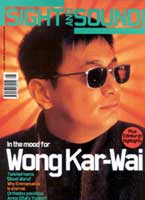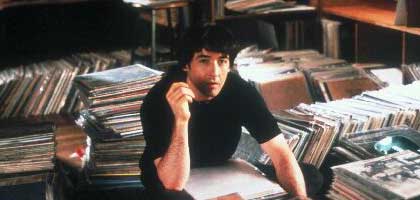
Tracks of my tears
Film of the Month: High Fidelity

Despite its cynical gloss on romance, High Fidelity is a sweet sentimental tale, remixed for audiences who think they're too smart for schmaltz. Andy Medhurst likes it so much he bought the album.
On the penultimate page of his novel High Fidelity, a story of love gone briefly wrong and a hymn of praise to second-hand record shops, Nick Hornby sums up the reconciliatory conclusion thus: "The rest of the evening is like the end of a film." The cinematic version takes him at his word, staging an outrageously feelgood climax in which all tensions are dissipated in a tableau of togetherness. It's heartwarming stuff, but so shockingly old-fashioned you almost expect Mickey Rooney and Judy Garland to step out of the shadows and croon a duet, and it points to one of the most intriguing aspects of High Fidelity (both in print and on screen): its ability to sell a tale drenched in sentiment to an audience of supposedly worldweary cynics.
The film, just like the novel, pulls off that stunt by playing a shrewd double bluff. It knowingly catalogues the tropes and rigmaroles of heterosexual romance so as to display its cleverness, to signal its superior distance from naive texts that take those games at face value, but then reinvests in those same clichés with a wholeheartedness that might have given even the late Barbara Cartland cause to blush. It invites us to enjoy the predictabilities because we know they are predictabilities - it's a text that lets us signal our smartness through our knowing surrender to dumb romance.
All of which makes director Stephen Frears' High Fidelity sound icily calculating, when in fact its great strength (its supreme dissembling trick, if you want to see it that way) is to come at you as warmly and eagerly as a large loping puppy. The story holds few surprises - there's never a shred of doubt that Rob's (John Cusack) lawyer girlfriend Laura (Iben Hjejle) will come back to him. The only reason she leaves at all is to open up the space for Rob to indulge in extended reflections on life, love, the magic of great music and the hopelessly adolescent fixations he has carried with him into early middle age. The film's decision to render those reflections through on-screen, straight-to-camera monologues is one of its few stylistic gambles. The model aspired to, evidently, is Alfie, though the comparison founders on the fact that Michael Caine's serial exploiter in the 60s film was revealed as a deeply nasty piece of work, whereas High Fidelity must, at all costs, keep Rob sweet and adorable. If anything, Cusack's solo musings reminded me rather more of the teenage know-all in the American television series Clarissa Explains It All. Clarissa's world is exactly that - Clarissa's, mediated wholly through her perspectives and sensibilities, and similarly in High Fidelity we see nothing that isn't filtered through Rob's eyes and mind.
Consequently, the film stands or falls on the portrayal of Rob, so it's fortunate in calling on the services of an actor as accomplished as Cusack. He lights up the screen with the glowing assurance of a man fully aware that he's the kingpin of all he surveys. Failure would have been catastrophic - if you don't warm to Rob, there isn't any film left - but happily Cusack delivers a brilliantly weighted study in calculated helplessness. The supporting players are pretty flawless too, with Jack Black's Barry a deft exercise in John Belushi impersonation and Todd Louiso all but stealing the picture by turning the lame duck Dick into a gentle doe-eyed creature that's half Michael Stipe and half Moomintroll. Tim Robbins enjoys a brief cameo as Ian, the villain who briefly steals Laura's affections, turning him into a hilariously hateful caricature of a New Age-y New Man, all ponytail and sanctimoniousness.
Note, however, all those male names. High Fidelity remains a lads' game from start to finish. The Danish actress Iben Hjejle impresses as Laura, the only woman remotely allowed to approach three-dimensionality, but female space elsewhere consists of a parade of fantasy figures, meek handmaidens and victims of jokes. The film's abiding disinterest in taking women seriously is encapsulated by its decision to offer only a couple of lines to Sara Gilbert, Roseanne's magnificent Darlene, turning her into the kind of appendage girlfriend Darlene would have torched with righteous contempt. Making Marie (played by Lisa Bonet), the singer Rob beds during his break with Laura, black (she's white in the novel) is also a dubious touch. It makes unavoidably obvious what was only a glimpsed subtext in Hornby's writing, the use of blackness as a crass signifier of authenticity among well-meaning white liberals.
The relentless masculinity of the film will be no surprise to readers of Hornby's novel, but what might wrongfoot them is the switch in location. On the whole, the Americanisation of the story does surprisingly little damage, though Rob's involvement in managing a pair of young skate/grunge musicians strikes a slightly jarring note. It's the only subplot the film adds to the novel, and it feels gestural and tacked-on, too crudely seeking to broaden the audience demographic. Similarly, I can't imagine Hornby's English Rob tolerating a Queen song on the soundtrack, though the use of music in the bulk of the film is so apposite as to form one of its major pleasures. Hornby's original musical reference points are both updated and broadened, but with knowledgeable finesse, making this almost certainly the first Hollywood film to namecheck Stereolab, the Beta Band and Belle & Sebastian. Rob's regrettable fondness for Bruce Springsteen (this is, after all, a story about heterosexuality) is taken a stage further, with Springsteen cropping up as a one-man Greek chorus.
High Fidelity also succeeds in convincing you that working in a record shop might just be the best job in the world, at least for certain kinds of emotionally retarded men. Rob's joy in being master of his own little vinyl principality is lovingly conveyed; he's the unchallenged taste-meister, mapping out the parameters of acceptable and unacceptable music, gently shepherding customers towards records they didn't come in to buy, but he knows will enrich their lives. It's a great act, and so easy to fall for that the day after the screening I went out and bought one of the albums Rob champions, though I can't disclose which one, since that would reveal my unhipness in not having it already - and no fan of High Fidelity could risk such an aesthetic faux pas.
Transplanting Rob's tribulations from London to Chicago leaves the core of the story untroubled. Boys will be boys in both cultures, after all, and High Fidelity is at its best when anatomising the foibles and failings of a particular kind of underachieving, obsessional male. The analysis never shifts into real critique, preferring gently and superficially to chide Rob's immaturity and fecklessness while massively endorsing him in the process. He may be a smart-aleck and a drifter and he puts all the emotional energy into pop-music trivia that he ought to invest in adult relationships, but he just can't help it and he's really cute too. No wonder so many men (me included) loved the book, and the film is far too sly and canny to disappoint us.
